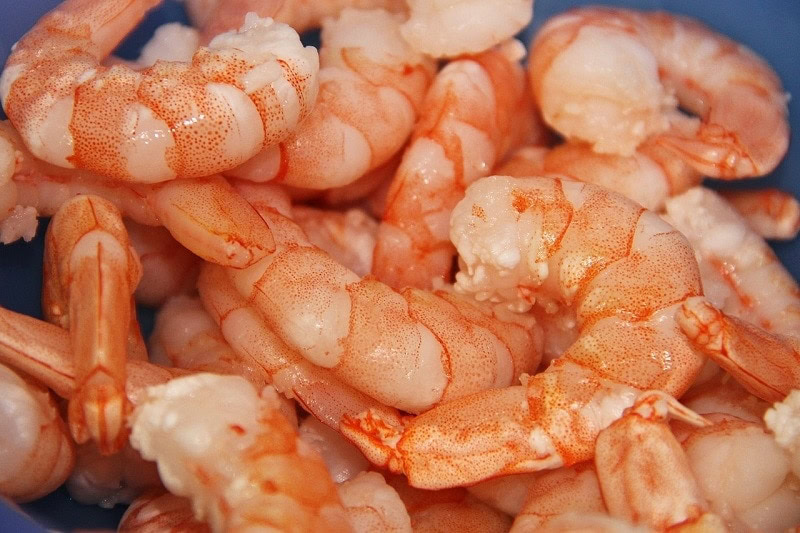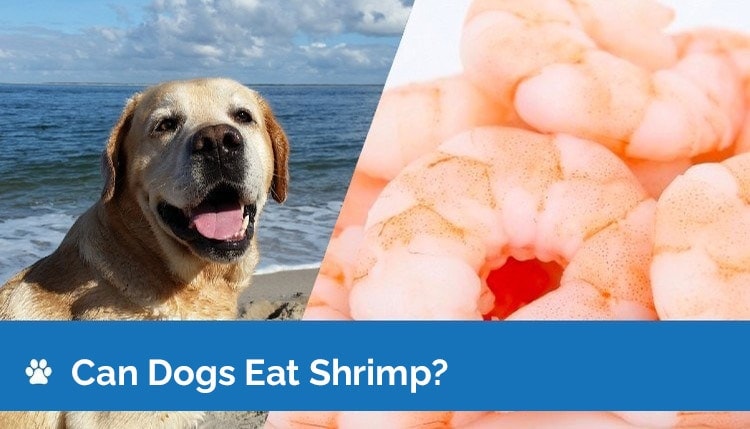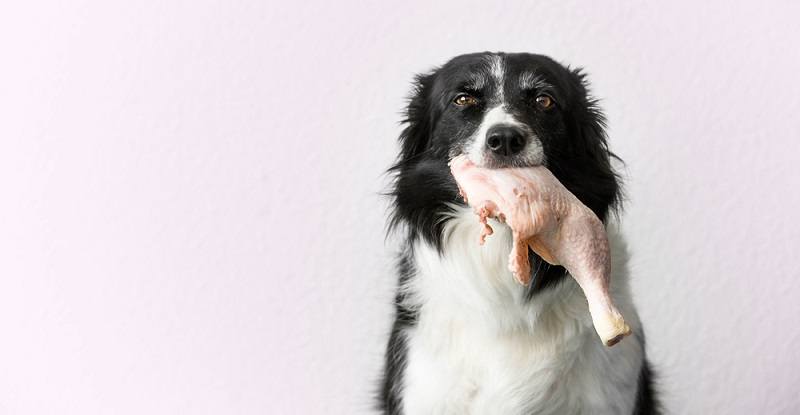We’re always being told the virtues of eating more seafood, and fish carries many of the same benefits for our dogs as it does for us. In particular, shrimps are rich in high-quality protein. They are also a good source of omega-3 fatty acids, and they are packed with antioxidants, too. This tasty seafood treat is also high in fat and is a known allergen. It is also a choking hazard and may harbor bacteria if not cooked properly.
While cooked shrimp is considered relatively safe for dogs in moderation, you shouldn’t give your dog the shell or tails, and you must ensure that it is fully cooked before feeding.
Benefits of Shrimp
Shrimp is a member of the crustacean family. People are encouraged to eat more foods like this because of its health benefits. Dogs, too, can benefit from eating a little shrimp.

- Niacin – Vitamin B3 can help improve and protect your dog’s coat and skin. It is also used to break sugars and fats into energy; therefore, it ensures that your dog gets plenty of energy from the food they eat.
- Vitamin B12 – Essential to your dog’s digestive system, vitamin B12 also aids in good brain and cognitive function while helping maintain your dog’s nervous system. Although most dogs get adequate levels of B12 in their diet, a deficiency can be damaging for your dog’s health.
- Antioxidants – Free radicals roam the body, looking to pair up with other electrons and potentially wreak havoc on cells, protein, and even DNA. Antioxidants neutralize free radicals by sacrificing their own electrons, leaving essential electrons to perform their required jobs. Shrimp is naturally high in antioxidants.
- Phosphorous – Along with calcium and protein, this nutrient helps maintain good bone strength and ensures that the joints are strong and healthy: vital to the physical function of your dog.
- Glucosamine – Derived from the shell of the fish, glucosamine is naturally also found in the shrimp itself. This also helps maintain joints and enables the cartilage to stay strong and healthy.
- Omega-3 – Fatty acids aid dogs in their brain and eye development, and also help protect their coat. Shrimp has a high omega-3 to omega-6 fatty acid ratio and is a great source of this essential nutrient.
So, shrimp contains a lot of goodness that your dog can benefit from. The shrimp itself is not toxic to your dog, as long as it has been prepared properly.
Don’t Feed Raw
Raw shrimp can cause paralytic shellfish poisoning. This can be fatal, but it is most often caused when dogs eat raw shellfish on the beach. Raw shellfish can also contain bacteria, including Salmonella, that are harmful to your dog. As such, you must ensure that it has been properly cooked. Even slightly undercooked shrimp can lead to illness. With that said, if your dog has eaten a small amount of raw shrimp, they will probably be alright, but you should monitor them and be prepared to call a veterinarian if they start to get ill.
Don’t Feed Shells or Tails
While it is generally considered safe for dogs to eat shrimp, you do need to ensure that it is fully shelled and the tails have been removed before cooking. The shell and tail are hard and brittle. They are very difficult to chew and can easily get stuck in the throat of your dog. The only way to prevent this choking hazard is to fully remove these sections.
Don’t Feed Processed Shrimp
Processed food is rarely good for dogs. The nutrients and goodness have been removed during the preparation, and most processed foods are high in salt and preservatives. A lot of seafood dishes also contain garlic and onion which are toxic to dogs, even in powder form. It’s best to avoid these at all costs when it comes to giving your pup a treat.

How to Prepare Shrimp
The simplest way to give your dog shrimp is to buy it cooked and frozen. Ensure that the shrimp is not prepared in any sauce or with other ingredients. This is especially true of garlic and onion, both of which are toxic to dogs and can cause them to become seriously ill.
Alternatively, buy fresh shrimp, ensure that they are fully shelled and deveined. Then boil them in hot water until they are pink and opaque.
How Much Shrimp Should Dogs Eat?
There is no set amount of shrimp to feed your dog. Generally, it is better to reserve this as a very occasional treat, and always err on the side of caution when it comes to portion size. Try feeding a few at any one time. Shrimp is quite rich, so even if your dog does not suffer any long-term negative effects, it can end up with an upset stomach, which is not great for them or you.
Alternatives to Shrimp
Although it is relatively safe to feed shrimp to your dog, other alternatives are safer, carry fewer risks, but still offer the same possible health benefits to your dog:
- Sardines are small and inexpensive. There is no shell or claw risk, and they are a great source of protein and omega-3 fatty acids.
- Salmon is commonly used in dog food recipes. Serve it cooked and remove the bones.
- Green-lipped mussels are found in some premium foods because they not only contain a lot of fatty acids but also glycosaminoglycans and their anti-inflammatory properties help to reduce the pain in arthritic dogs.

 Is Shrimp Safe for Dogs?
Is Shrimp Safe for Dogs?
Shrimp is safe for dogs, but there are risks. As such, it may be a good idea to avoid feeding these and other shellfish and crustaceans if you have any reason to believe they may put your pup at risk of feeling sick. Similar and safer alternatives include salmon and green-lipped mussels. If you do feed your dog shrimp, ensure that you have removed the shell and claws, that the food is thoroughly cooked, and that you do not feed them too much at a time.
Featured Image Credit: Shutterbug75, Pixabay



 Is Shrimp Safe for Dogs?
Is Shrimp Safe for Dogs?


